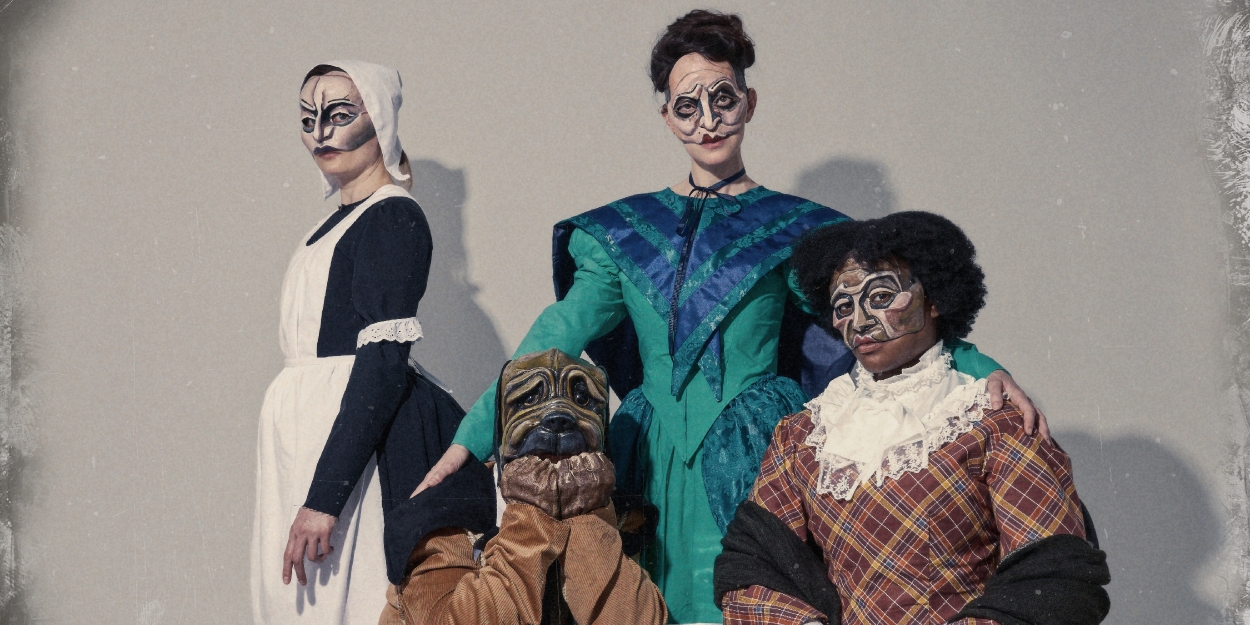Review: THE MOORS at Faction Of Fools
Jen Silverman's Brontë takeoff gets Commedia dell'Arte treatment

The Faction of Fools Theatre Company specializes in the arcane form of the Italian Renaissance, commedia dell’arte, with elaborate masks, exaggerated movements and a kind of extreme reading of what often are classic texts. The troupe’s “Commedia Romeo and Juliet,” revived earlier this year, was a good example of that.
To close the company’s 15th season, they’ve chosen a contemporary work, “The Moors,” by Jen Silverman, an of-the-moment playwright whose latest work, “The Roommate,” with Mia Farrow and Patti LuPone, is about to open next month on Broadway..
“The Moors,” which premiered in 2017, turns out to be its own takeoff on a very specific genre — the windswept romantic dramas of the Brontë sisters, but retold in contemporary language, where the principals are entirely women and the action can go very wrong.
The Faction of Fools version of “The Moors,” then, is a further variation on something that began as a variation. So while it’s a laudable venture, it can also get a bit weird.
The moors as a setting, though, are well depicted in the elaborate set by Johnny Weissgerber. Rarely has the black box theater space at the Capitol Hill Arts Workshop been so fully dressed, with the forboding bricks of the moorish home of two sisters, looking out at the mountain crags out the back, a perfect setting for the occasional lightning and storms, courtesy William K. D’Eugenio’s lighting design and Kenny Neal’s sound.
Once more, the masks are almost the stars of the event and they were designed by Tara Cariaso of Waxing Moon Masks, working with each specific actor such that their wild angles and arched eyebrows seem a part of the warped characters.
This works best on the show’s standouts, Natalie Cutcher as a longing sister who seems a little off, whose expressions behind the mask — in eyes and mouth — are natural and funny extensions of the mask’s extremes.
That may be even more so with Rebecca Ballinger as a dour scullery maid with two personalities and a bad attitude. With a prickly personality to match the angles of the mask, she’s a lot of fun to watch.
Under the direction of co-artistic director Francesca Chilcote, both women exaggerate movements with nearly every line, with sharp head motions toward each other or to the audience as they’re speaking, using their hands, especially in the case of Cutcher, in an almost balletic manner.
The central action of the play, though, seems to be between a bullying sister, played by Arika Thames, whose withering lines come with thundering effectiveness, and a woman who comes to be the governess (Jasmine Proctor) who stands out because her cheeriness is such a contrast to the dreary setting (this could seem so because of a more bubbly mask as well).
Her mood changes as time goes by, and Thames’ character softens as well. With those shifts, though, the masks seem to change as well, losing their hard angles, and at some point seemingly just melting into makeup.
This all seems a turn away from the usually strict rules of commedia dell’art, with the movements less sharp, and the characters becoming more human as their facades recede.
A whole side story to “The Moors” involves a doomed romance between a dog and a moor hen, who seem to violate the commedia dell’arte rules from the startl, with no masks at all but instead headgear to indicate their species (costumes by Alison Samantha Johnson). Yes, there is a role for a man in the play — but Ricky Drummond has to play a dog. Mary Myers is opposite him as the understandably confused bird.
There are moments to savor as the commedia begins to fade, none so much as a torch song delivered by Cutcher with bubbles out of Lawrence Welk.
But actions at the end seem both abrupt and easy ways out after a play whose intent was not entirely clear even before they put the masks on.
Running time: Two hours, with one intermission.
“The Moors” by the Faction of Fools Theatre Company plays through Aug. 10 at the Capitol Hills Arts Workshop, 545 7th St SE. Tickets available online.
Reader Reviews
Videos

